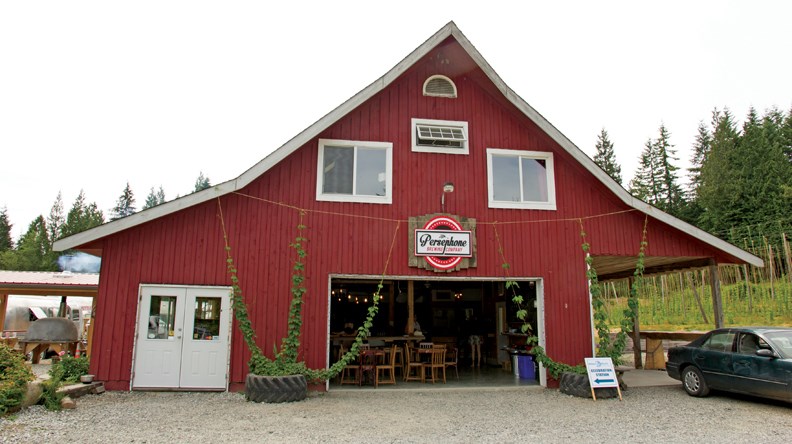The owners of Persephone Brewing Company say they’re optimistic about finding a way to bring their beer farm into compliance with Agricultural Land Reserve (ALR) rules, after the Agricultural Land Commission (ALC) turned down their application for non-farm use.
In a written decision dated Dec. 19, 2016, the ALC rejected Persephone’s proposal for a brewery, tasting room and food truck on its ALR land off Stewart Road just outside Gibsons.
Persephone’s Brian Smith said they were disappointed, but not completely surprised by the ruling.
The brewery and the other features are already there, and have been since 2013, which is one of the difficulties the ALC had in weighing the application.
“The panel has been put in a difficult position, whereby the proposed non-farm use is, in fact, an existing non-farm use,” the decision reads. “In a situation where the panel must retroactively consider a non-farm use, the panel must give consideration as to whether or not it would have allowed the proposed use if the contravention had not taken place.”
The ruling also gives Persephone two years to “demonstrate compliance” or relocate the brewery, tasting room and food truck to non-ALR land.
“Two years is a long time,” Smith said. “For the foreseeable future nothing really changes. We can continue to operate, and they’ve effectively said, ‘We’re giving you a long runway to figure out how to do this.’”
Breweries were added to the list of permitted uses on ALR land in 2015, as long as 50 per cent of the ingredients for the beer were grown on the farm. Persephone grows its own hops, but has to buy barley from other suppliers. The ALC policy that allows for breweries says hops don’t count toward the 50 per cent “due to the [small] quantities of hops involved in the beer making process.”
Smith said one way to solve the dilemma is for the province to change that rule.
“We believe in the ALR and we want our business to be a model for how the ALR can work,” he said. “And I believe that’s what the province wants too. The province has shown they want to support new business models on the ALR to figure out viability for local farms. … They made the point of saying, ‘We want breweries in the ALR,’ but the way they worded it in the regulations has its shortcomings.”
He also said there could be ways within the current rules to meet that 50 per cent threshold, such as growing grain for the beer on a separate – but still Persephone-owned – property.
The Sunshine Coast Regional District (SCRD) planning committee had the ALC ruling as correspondence on its Jan. 12 agenda, and Smith said he thinks recent changes to the SCRD’s zoning rules favour the business model Persephone is striving for.
“The SCRD has shown support in a couple of different ways. One is that they support our non-farm use application, and that meant a lot. The second is they updated their AG zone bylaws to align with both our non-farm use application and with the winery/cidery regulations within the ALR.”
Smith also said that as well as wanting to assure customers the ruling won’t mean any immediate changes at the brewery, Persephone wants to encourage them to get involved in the bigger discussion around the future of local agriculture.
“We want our customers to become advocates for local agriculture. We want them to be on farms, and buying from farmers direct. … We want them to be part of this discourse, publicly, as much as possible.”



